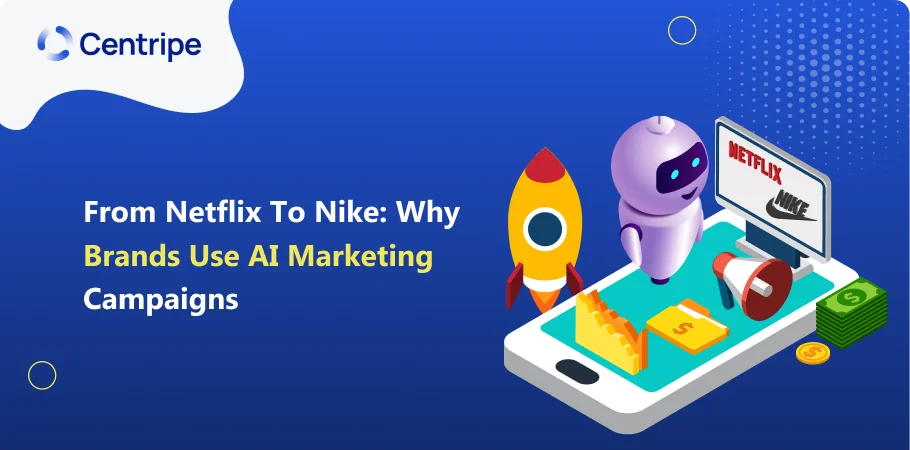Artificial intelligence (AI) is changing the way brands connect with their audiences. The industry is undergoing a transformation because of AI marketing campaigns which deliver both recommendations and chatbot services. The obtained outcomes show clear evidence of success.
The data gathered by MSPoweruser shows that marketing executives have started implementing AI in 73% of their current marketing approaches.
The major brands Netflix, Nike, Starbucks and Coca-Cola deploy AI marketing strategies to offer customized interactions that raise user engagement levels.
AI brings substantial changes to marketing operations through its underlying mechanism. Modern marketing and advertising strategies heavily rely on AI because brands have found innovative ways to use artificial intelligence technology.
How AI has impacted marketing
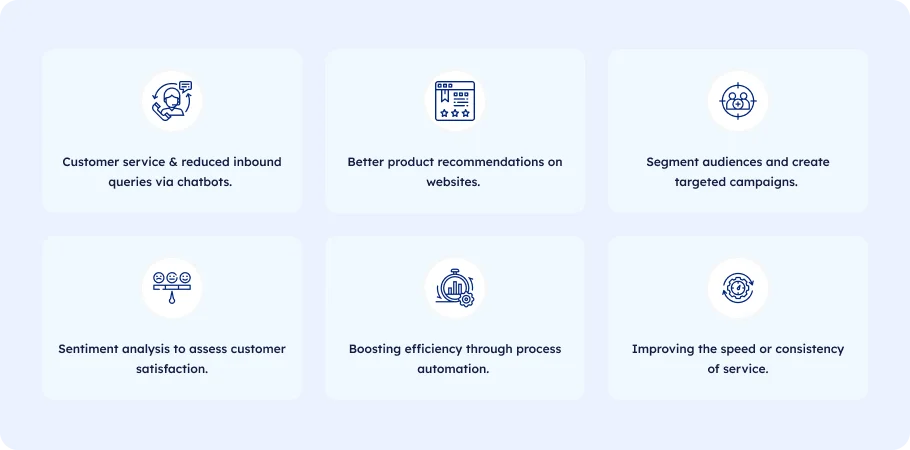
AI is no longer a futuristic concept; it’s an everyday reality in marketing. By using its capability to process enormous data amounts AI enables brands to design unique customer experiences that surpass all previous standards.
The primary benefit of AI marketing campaigns chooses to automate various operations. Programmed artificial intelligence systems operate efficiently in performing daily jobs including email marketing and customer support together with social media engagement activities.
AI tools enable brands to assess customer conduct and identify market patterns and enhance marketing strategies live. With AI marketing campaigns brands deliver personalized product suggestions while chatbots deliver prompt customer service to establish smooth and captivating interactions with their target audience.
How AI helps brands Connect, Convert, and Thrive
AI transforms marketing by enabling hyper-personalization, real-time engagement, data-driven insights, optimized ad spending, and deeper emotional connections, creating smarter, more impactful brand strategies.
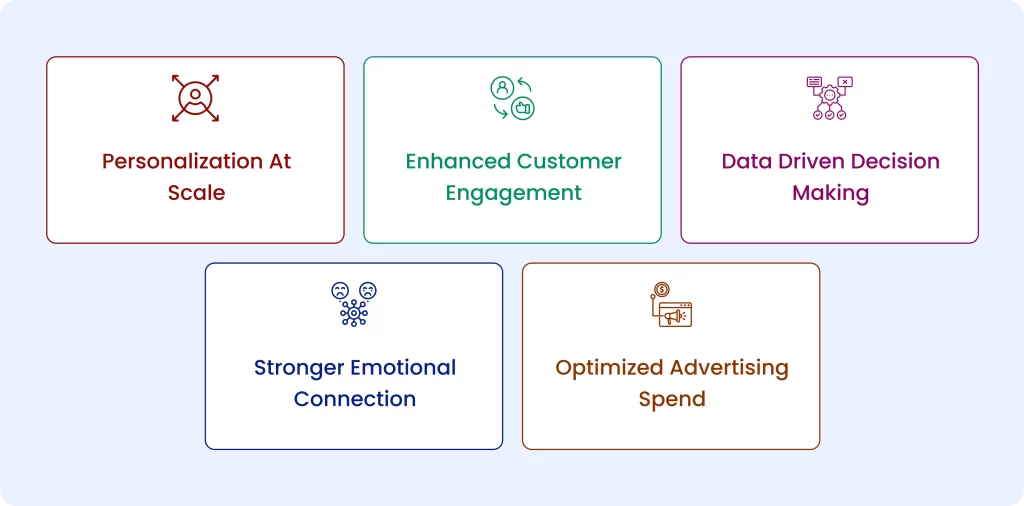
1. Personalization at Scale
Through AI, marketing brands achieve the ability to deliver unique content that matches each individual user in massive quantities. Through its capability to analyze past purchases AI generates product recommendations alongside content curation that perfectly aligns with individual customer preferences.
2. Enhanced Customer Engagement
With AI, brands can interact with customers in real time. Users receive automatic support through AI-powered virtual assistants which provide instant support to customer questions and help them finalize their purchase selections. The system maintains user interest while delivering improved member satisfaction.
3. Data Driven Decision Making
AI system analyzes enormous data volumes which leads to valuable marketing insights that guide brand decision-making. By identifying patterns and predicting consumer behavior, AI ensures that AI campaigns are more effective and targeted.
4. Optimized advertising Spend
AI helps brands allocate their advertising budgets efficiently by analyzing which ads perform best and optimizing spending in real time. ROI grows stronger because these measures minimize advertising expenses which results in better return on investment.
5. Stronger Emotional Connection
AI doesn’t just process data, it can analyze emotions behind customer interactions. Through AI approaches Nike and other brands obtain emotional insights from their customer feedback to improve their AI marketing and ad campaign generator strategies.
How brands are using AI in marketing campaigns
From personalized recommendations to AI-powered content creation, brands are revolutionizing marketing with artificial intelligence, delivering hyper-targeted, data-driven, and emotionally engaging experiences that keep customers hooked.
1. AI-Powered Recommendations: Netflix’s recipe for success

The personalized recommendation algorithms of Netflix are well known throughout the industry. But how is AI used in advertising by Netflix? AI tracks a user’s viewing habits, analyzing what they watch, when they watch, and even how long they watch. The platform analyzes user viewing data to provide recommendations that match user preferences.
For example, if you love watching thrillers late at night, Netflix will recommend similar content to keep you engaged. The AI-based customization system boosts customer retention by extending their viewing period and decreasing subscriber turnover rates which keeps users dedicated to the platform.
2. Virtual Try-Ons: Sephora’s AI marketing strategy
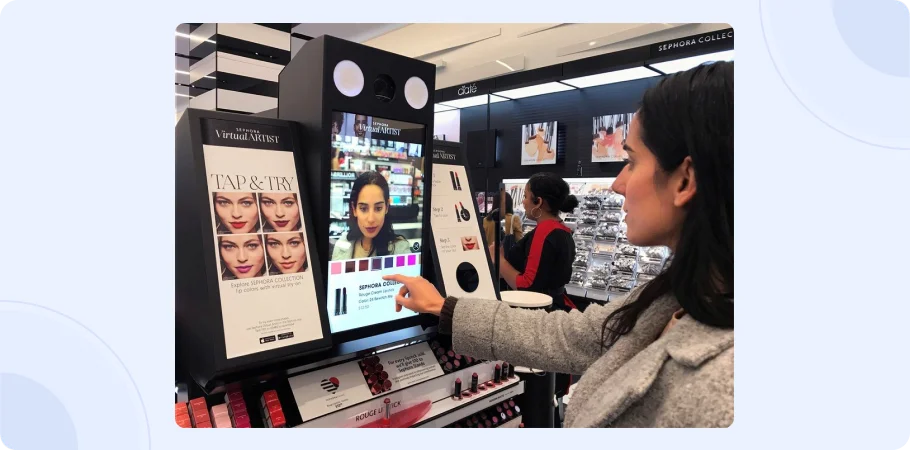
Sephora takes personalization to another level with AI-powered virtual try-ons and chatbots. Through mobile device application customers can preview how different beauty products would appear on their complexion before buying them.
Through their AI chatbot system Sephora provides beauty recommendations along with product suggestions in addition to instant service in multiple languages.
By enhancing customer experience Sephora strengthens brand loyalty among their client base. The result? Customers experience better satisfaction alongside diminished human support waiting periods.
3. Coca-Cola x Marvel: Coca-Cola‘s content creation strategy
Source: Coca-Cola
Through AI, Coca-Cola develops compelling advertisement content. Coca-Cola used AI-generated advertising campaigns to team up with Marvel for creating customized video ads that included superheroes as characters.
Coca-Cola used AI technology to analyze consumer information which enabled them to provide made-to-order video advertisements for separate market segments.
Through their AI-powered strategy Coca-Cola managed to improve audience engagement as well as build stronger emotional bonds with their audience.
Support from AI technology enables the marketing teams and campaigns to reform how brands convey their stories through personalized advertisements.
Automate your ads with our AI marketing campaign generator—maximize ROI with ease!
4. Emotion-driven advertising: Nike’s AI strategy

Since its establishment Nike delivered emotional inspiration to worldwide athletes and fitness enthusiasts.
AI helps Nike understand customer sentiments by analyzing social media posts, conversations, customer reviews, and even athlete testimonials.
Product-related emotional links help Nike design marketing campaigns that activate motivational and inspirational feelings.
Through this approach Nike achieved better customer advocacy along with enhanced social media interactions as well as deeper emotional bonds between themselves and their followers.
5. Personalized music playlists – Spotify’s AI success story
Spotify’s AI-driven approach to music recommendations has been a game-changer in the streaming industry.
Users can generate “Discover Weekly” playlists from AI systems that analyze their listening behaviors together with their favorite genres and preferred listening times.
The customized experience maintains user interest which increases their platform usage.
Through AI marketing case studies, Spotify has achieved strengthening brand commitment together with growing its user base retention.
Emerging trends in AI marketing
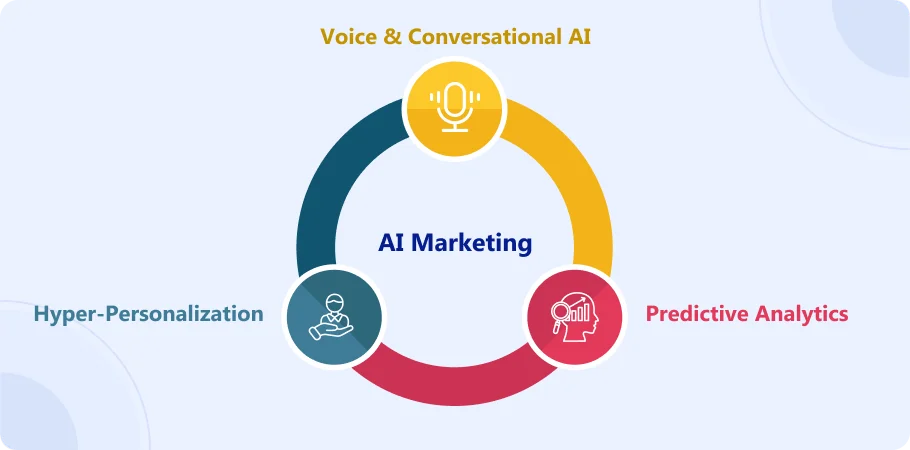
Brands embracing AI marketing technology will maintain their market leadership while competing against rivals because this technology develops rapidly. Future developments will contain these following elements.
Voice & conversational AI: Brands will implement AI-powered voice assistance systems to have real-time conversations with customers as part of their digital strategy.
Predictive Analytics: A better capability of predicting customer behavior will be achieved by AI which will lead to data-based marketing decisions.
Hyper-Pe rsonalization: AI will refine its ability to deliver even more precise and customized content to users.
Personalize. Optimize. Convert. AI Does It All
Why your brand should embrace AI marketing campaigns
You should utilize AI marketing campaigns because successful businesses such as Netflix and Nike and Sephora already employ this strategy. AI marketing efforts can help you:
- Improve customer engagement
- Increase conversions
- Enhance personalization
- Reduce marketing costs
- Optimize ad performance
How to get start with AI advertising
Not sure where to begin? Your implementation of AI into your marketing strategy starts with the following sequence of steps:
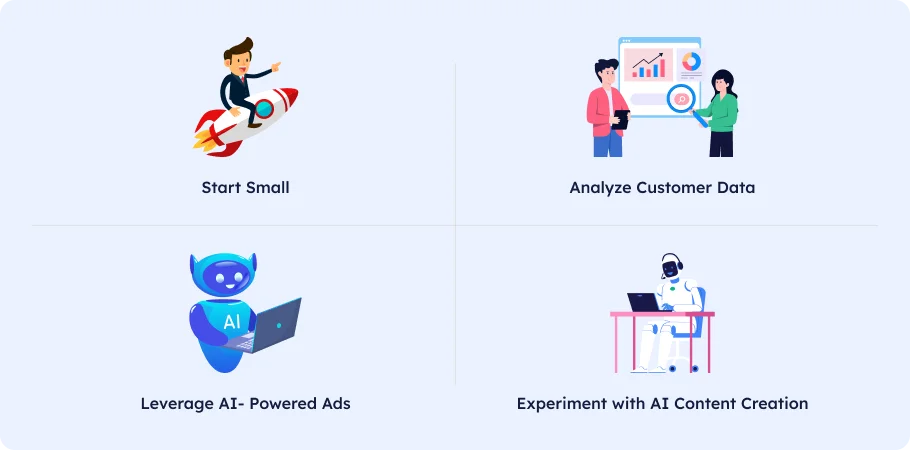
- Start Small: Your business should employ AI chatbots for customer support and AI-powered email automation next.
- Analyze Customer Data: Take advantage of AI algorithms to survey consumer actions so you can improve your marketing plan.
- Leverage AI- Powered Ads: Your next move should be to invest in ad targeting which uses AI technology to help you reach your desired audience.
- Experiment with AI Content Creation: Test AI Content Development Tools by utilizing them to produce subject concepts and create individualized text.
Common question on use of AI in campaign
1. What are the potential risks of using AI in marketing?
The execution of content through artificial intelligence can produce results that differ from your brand identity and could misinterpret cultural nuances, leading to inappropriate messaging.
2. Will AI replace human marketers?
While AI enhances efficiency in data analysis and automation, it cannot replicate human creativity and empathy essential for developing compelling marketing strategies.
3. How can AI improve content creation?
Artificial intelligence supports content production through its capacity to recommend topics and produce draft texts and optimize content search performance.
4. What are some best practices for integrating AI into my marketing strategy?
Start by clearly defining your goals and gradually implement AI tools in specific areas, such as email campaigns or landing page personalization, to test effectiveness before broader application.
5. How does AI assist in understanding customer behavior?
Through data analysis AI establishes behavioral patterns which lets marketers run targeted and effective marketing campaigns.
Conclusion
AI marketing campaigns stand as an irreplaceable marketing model for the upcoming years. AI enables brands to create stronger bonds with their audience base through customized recommendations at Netflix and emotional-driven ads at Nike.
One must begin the AI integration if your brand has not implemented this technology yet. Through AI marketing initiatives organizations achieve higher audience participation along with enhanced customized experiences that promote enterprise expansion. The present and future of marketing exist because of machine learning. AI serves as the technological leader in this field.
